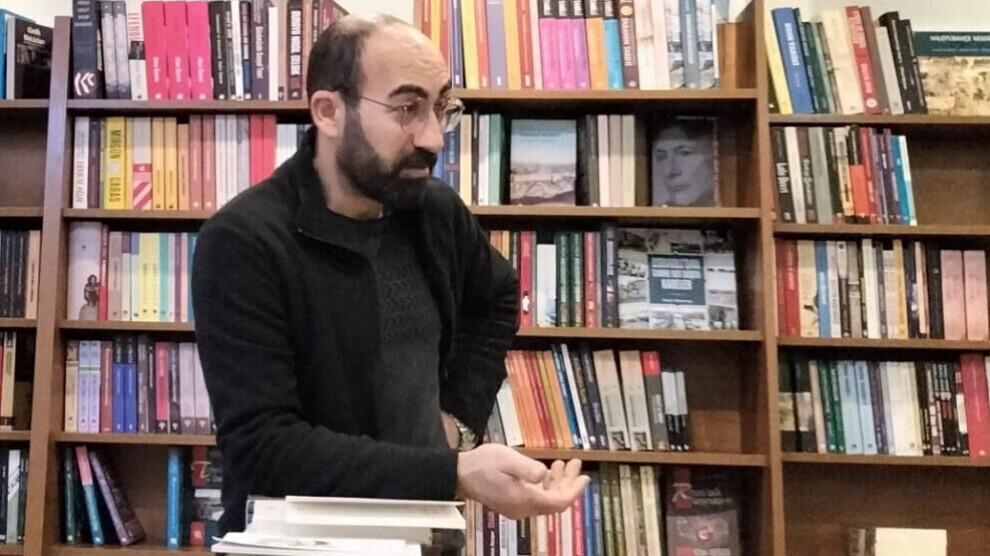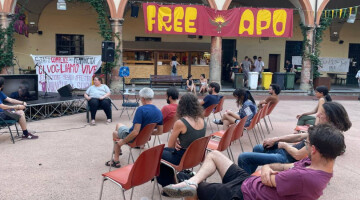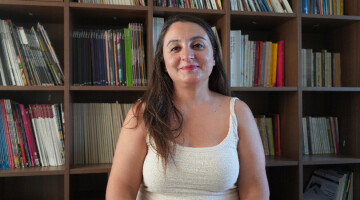Despite the ban and suppression of the Kurdish language, Kurdish literature is developing rapidly. Writer Mehmet Çakmak spoke to ANF in Amed about the present and future of the Kurdish language and literature.
Can you briefly introduce yourself? Where did your interest in Kurdish literature come from and when did you start writing yourself?
I was born in 1980 in a village of Amed. When I was a little kid, I moved to Mardin with my family. For a while, I lived in big cities in Turkey. And then there was my time in prison. After my release, I settled in Amed and I have no intention of moving again.
I was interested in literature as a child and started writing in prison. It quickly became clear to me that I had to write in Kurdish. An inner voice told me that. Since 2002, I've only been writing Kurdish. Except for translations, I hardly write anything in Turkish.
So far, three stories and two books that I have translated have been published. In addition to writing, I did various jobs, mainly editing texts. This is how I develop myself further. I've worked with several publishers, including Aram Verlag. That brought me a lot. About two years ago, I started my own publishing house with a friend. As Payiz Verlag, we have published 25 books so far.
How do you assess the situation of Kurdish literature and the publishing industry in Turkey?
The answer to the question is actually clear. Kurdish literature and publishers are in the same situation as the Kurdish language in Turkey. As a society, we are living a time that is not new to us. Nevertheless, the point that Kurdish literature has reached under the conditions of today's Turkey should not be underestimated. A rapid development has taken place and Kurdish literature has long since moved beyond the mere struggle for existence. Not so long ago we were discussing whether there was Kurdish literature at all. That is over, in my opinion. Now we are discussing quality.
The published works have reached a certain level both qualitatively and quantitatively. Kurdish publishing has also made progress. In Turkey alone, over two hundred Kurdish books are published every year. That is not a small amount under the given circumstances. The quality is arguable, but in my opinion, the number is also important. In the meantime, good books are often written in prisons too. Unfortunately, most of them cannot be published for years.
What difficulties do you experience as a Kurdish author when it comes to writing, editing and publishing?
Writing has to be a continuous activity or nothing good will come out of it. It has to be a routine in life. Adhering to this routine is difficult and arduous due to our living conditions. If you write in Kurdish, the conditions are even tougher. You have to deal with a lot of difficulties. You accept these difficulties in advance. So it is a conscious and deliberate decision.
The action of writing is subject to various circumstances. In order to print what has been written, you have to undergo the process of editing and eventually publishing the text. It's a long process. And eventually the book also has to reach the readers. And this is even more difficult. There are only a few people in Turkey who read Kurdish. This is mainly due to the fact that there are no Kurdish classes in Turkey. Without education, language development runs the risk of coming to a standstill. There are fewer and fewer young people who can speak Kurdish.
And how do you see the future of Kurdish literature?
Actually, I'm not very pessimistic. Despite all the difficulties, Kurdish literature has come a long way. I am still worried about its future and development. The development runs parallel to the Kurdish language.
What influence do the bans on books and repression have? Do the bans threaten the existence of Kurdish culture?
In an atmosphere of prohibition and oppression, no natural development can take place. During the time when the town halls belonged to the people, work was carried out to favour the development of the Kurdish language. There were Kurdish signs on all municipal buildings. When the trustees arrived, the first step they took was to remove the Kurdish signs. In my opinion, it wasn't just about removing the signs, it was an ideological approach. In other words, the message was clear: I don't recognize you, you don't count for me.
The state is, of course, not limited to routine. As far as I know, over two hundred Kurdish books have been banned in the past ten years. Anywhere else in the world this would have caused mayhem, but in Turkey this is taken as normal. Many authors and journalists have been jailed and sentenced. In recent years, many people who write have also been forced to leave their homeland. In addition to the difficulties mentioned, the prohibitions and oppression naturally have an anti-development effect on Kurdish literature.
However, Kurdish literature certainly won’t go away. As long as there is a Kurdish society and it is struggling for its existence, I am not worried about it. Kurdish literature will not die or fade out and the Kurdish language will continue to exist.
What measures do Kurdish authors take against bans and repression?
There are some groups in which Kurdish authors organize. In the past, several facilities have been closed by decree. At the moment there are institutions like Pena Kurd and the Kurdish Literature Association. Of course, attempts are made to limit their activities using prohibitions and oppression. There are also solidarity activities with individual members. That is, of course, not enough, but the very existence of such institutions gives us as writers and publishers strength and motivation under the circumstances.
Do the Kurdish people stand behind their own literature? Is there enough interest in it?
We, the Kurdish people, are now a politicized society. We have a political identity and show social concerns. Unfortunately, the same attitude is not shown for the Kurdish language. If Kurdish is hardly spoken even in the villages today, we as a society are in great danger. The use of the Kurdish language has decreased noticeably. The development of Kurdish literature follows a parallel course. Speaking and reading Kurdish must finally become a basic political stance. To stand up for one's own language, to speak and read it, is a fundamental measure of value for love towards one's own country. Above all, we need to invest in our children.















